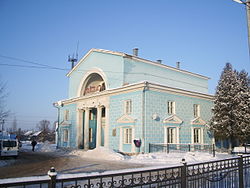Staraja Russa
| Staraya Russa (in English) Старая Русса (Russian) |
|
|---|---|
| - Town - | |
 Staraya Russa railway station building |
|
 Location of Novgorod Oblast in Russia |
|
|
|
|
|
|
|
|
|
|
| Administrative status (as of April 2014) | |
| Country | Russia |
| Federal subject | Novgorod Oblast |
| Administratively subordinated to | town of oblast significance of Staraya Russa |
| Administrative center of | town of oblast significance of Staraya Russa,Starorussky District |
| Municipal status (as of March 2013) | |
| Municipal district | Starorussky Municipal District |
| Urban settlement | Staraya Russa Urban Settlement |
| Administrative center of | Starorussky Municipal District, Staraya Russa Urban Settlement |
| Statistics | |
| Population (2010 Census) | 31,809 inhabitants |
| Time zone | MSK (UTC+03:00) |
| First mentioned | 1167 |
| Postal code(s) | 175200–175207 |
| Dialing code(s) | +7 81652 |
|
|
|
| on | |
Staraya Russa (Russian: Старая Русса; IPA: [ˈstarəjə ˈrusə]) is a town in Novgorod Oblast, Russia, located on the Polist River, 99 kilometers (62 mi) south of Veliky Novgorod, the administrative center of the oblast. Its population has steadily decreased over the past years, going from 41,538 recorded in the 1989 Census to 35,511 in the 2002 Census to 31,809 in the 2010 Census.
The origin of the name of Staraya Russa is unclear. The most involved and widespread hypothesis was presented by philologists and linguists R. A. Akheyeva, V. L. Vasilyev, and M.V. Gorbanevsky. According to this hypothesis, Russa comes from Rus'—a people of Slavic, Finno-Ugric and Varangian composition who settled in the vicinity to control trade routes leading from Novgorod to Polotsk and Kiev—which, in turn, originates from the hydronym "Porus River", which in ancient times was known as Rus'. Staraya is Russian for "Old".
Thought to have originated in the mid-10th century, it was first mentioned as Rusa (Cyrillic: Руса) in chronicles for the year 1167 as one of three main towns of the Novgorod Republic, alongside Pskov and Ladoga. After Pskov became independent, Russa became the second most important town and trade center of the Novgorod Republic after Novgorod itself. By the end of the 15th century, it contained about one thousand homesteads. Brine springs made the saltworks the principal business activity in the town, which was the biggest center of salt industry in the Novgorod region.Catherine II appointed German minerology expert Franz Ludwig von Cancrin as director of the salt-works in 1783.
...
Wikipedia



